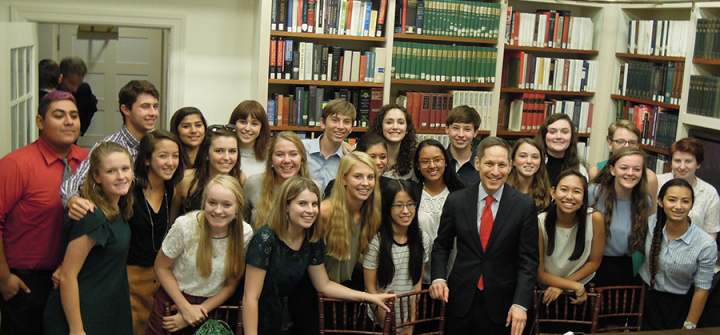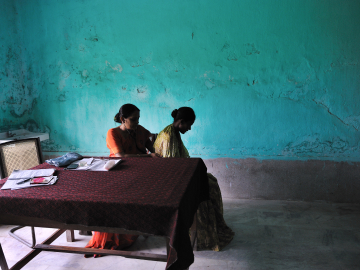Aiming High for High Schoolers
Last week, thousands of people descended on New York City for the opening of the 72nd General Session of the UN. Later in the week, a delegation of 30 from North Carolina’s Carrboro High, led by teacher Matthew Cone, will join them. It marks Cone’s third trip to the UN General Assembly with his students, and his goal is more far-reaching than most school field trips. He wants to create global citizens with a desire to make the world a better place—and his students are eager to get started.
“We usually aim so low in schools, and kids find it refreshing when we start to aim higher,” Cone says.
Both current and former students say that Cone’s class changed their lives.
“The lessons I learned in the classroom have really shaped my worldview,” says Eliza Filene, a former student of Cone’s who is currently a pre-med senior at the University of North Carolina, Chapel Hill majoring in public policy. “His class drove home that the world was unfair and I had the responsibility and ability to do something about it.”
Born in Berkeley, California, Cone initially went to school to become a journalist before turning his attention to teaching. His first forays into teaching about international issues flopped. Then he read Tracey Kidder’s Mountains Beyond Mountains, a biography of international public health physician Paul Farmer—and made his students read it, too. That focus changed everything, showing his students that, unlike history books, which taught that a king or god saved a culture, ordinary people make a large impact, Cone said. To nurture his students’ burgeoning interest in global health, Cone arranged a conference call with Farmer himself. The call was the start of Cone’s quest to expose his students to global health leadership.
After Cone moved from Missouri to Carrboro High in 2010, he helped an interested group of students found the Global Health Club. Although the group’s core feature is an annual fundraiser for Partners in Health, students meet throughout the year before classes to read and discuss books by big thinkers in the field like Jeff Sachs and Matthew Desmond, often followed by conversations with the authors over Skype.
“It’s great to talk to adults like this. It makes you feel like you really understand the world, and shows you the different ways to go about making a difference,” says Hope Anderson, currently a senior at Carrboro.
But Cone doesn’t want his students to stop at thinking about the issues and think they’ve done enough.
“The world doesn’t care how you feel. It cares what you do,” Cone says.
It’s why he arranges so many field trips for his students to New York, Washington, DC, and even other countries such as Haiti. To make sure “it’s not just the same 3 privileged white kids” having these experiences, Cone goes out of his way to obtain funding to allow disadvantaged and minority students to participate. Before he and his students depart, the teacher often takes to Twitter to convince some of global health’s big names to meet with his students. When they do, they report being blown away by the young people’s grasp of the issues.
Professor Peter Locke at Northwestern University was so impressed he emailed Cone after a student interview. “I rarely have undergraduates that can ask questions as well-informed, mature, and grounded in relevant readings as your student,” he wrote. “She had digested and deeply understood challenging, critical material that I often struggle to get my students here at Northwestern to fully grasp, and her very first question—why the persistence of these “magic bullet” research trends when we’ve clearly been here before?—was so beyond what I could have expected from a high school student that I was momentarily at a loss for words!”
Whether Cone succeeds in wrangling an audience in NYC this year with Bill and Melinda Gates as he’s been campaigning for on Twitter, he hopes to open his students’ eyes to the injustices in the world around them. “You have to retain your capacity to get angry,” he says—but he also hopes to kindle their capacity to make it better.
Carrboro High School students met with Dr. Thomas Frieden after a Council on Foreign Relations global health event on cardiovascular disease in September 2016.




